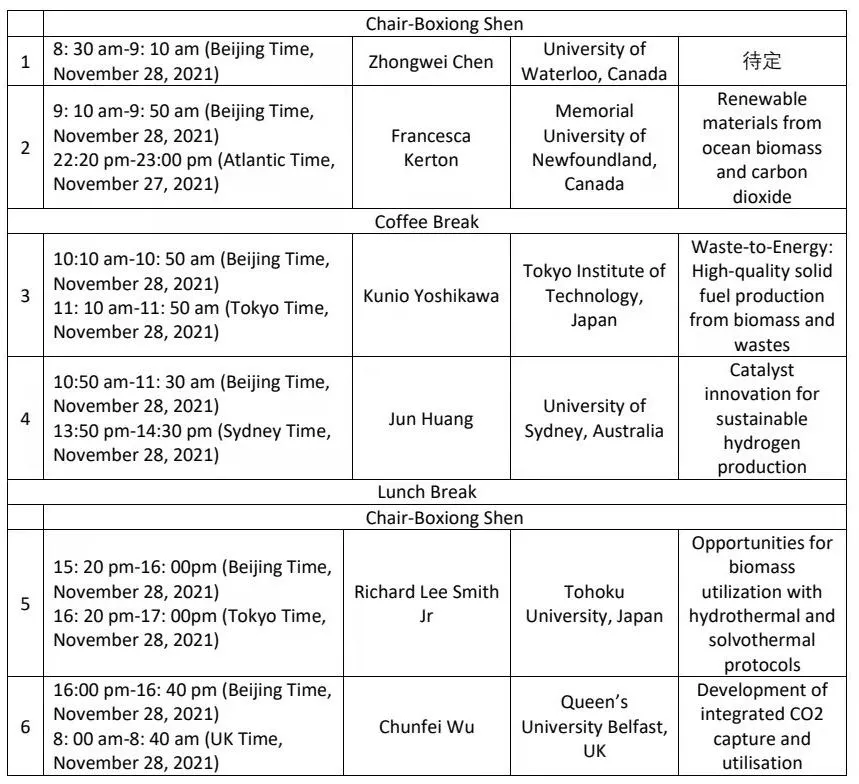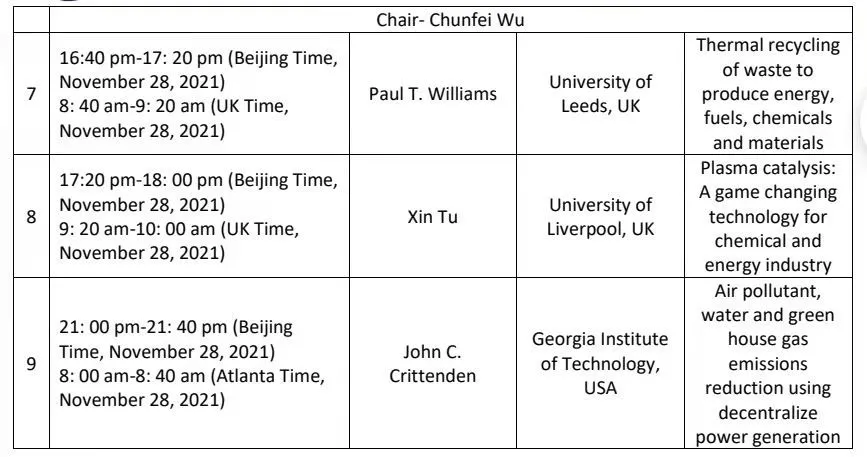中国政府积极应对《联合国气候变化框架公约》,提出“碳达峰、碳中和”战略目标。在此战略目标下,低碳技术与可持续发展已成为化工、环保、能源、材料等领域研究热点。低碳技术成为了产业转型升级、资源高效利用与污染物控制的重要途径。依托化工节能过程集成与资源利用国家地方联合工程实验室、天津市清洁能源利用与污染物控制重点实验室等国家和省部级平台,河北工业大学邀请了来自美国、英国、日本、加拿大、澳大利亚等海外著名学者,将于2021年11月28日(北京时间)在线举办“低碳技术与可持续发展海外名师讲坛”。
讲坛围绕先进低碳技术和可持续发展主题,特邀专家包括加拿大两院院士Zhongwei Chen教授、美国工程院院士John C. Crittenden教授、Applied Energy副主编Kunio Yoshikawa教授,以及英国生物质能源领域著名专家Paul Williams教授等,针对领域最新研究进展,以及如何在高水平国际期刊发表学术论文等进行学术报告,分享其成功经验,共同推进国际交流和社会进步。
会议主办:
能源利用过程污染物控制河北省创新研究群体
河北工业大学化工学院
河北工业大学能源与环境工程学院
On-line Forum Platform:
(1) Microsoft Teams:
https://teams.live.com/meet/95952033881649
(2) 腾讯会议Tencent ID:
496-281-211或 631-436-324


Academic forum on Low-Carbon
Technology and Sustainable Development
Actively responding to the United Nations Framework Convention on Climate Change, China is making an effort to achieve the goals of peaking carbon emissions and subsequent carbon neutrality. In the context of this strategic goal, low-carbon technology and sustainable development have become a research hotspot in the fields of Chemical Engineering, Energy, Environment and Materials Science. Low-carbon technology has become an important approach for industrial transformation and upgrading, sustainable use of resources, and effective pollution control. Relying on National-Local Joint Engineering Laboratory for Energy Conservation in Chemical Process Integration and Resources Utilization, Tianjin Key Laboratory of Cleaner Energy Utilization and Pollution Control and some other national and provincial platforms, Hebei University of Technology will hold an online academic forum on “Low-Carbon Technology and Sustainable Development” on November 28, 2021 (Beijing Time). Nine world-renowned scholars from US, UK, Canada, Australia and Japan have accepted the invitations for the keynote speeches, and will share their most recent research activities in the area of low carbon technologies deployment in various sectors (industry, households, transport, etc.), and successful experiences on how to publish in high quality scientific journals. The purpose of the forum is to promote international academic exchange and cooperation in the field of low carbon technologies and sustainable development.
会议安排


Short Biography of Invited Experts:
Professor Zhongwei Chen
Fellow of the Royal Society of Canada
Fellow of the Canadian Academy of Engineering
Associate Editor of ACS Applied Materials & Interfaces
Vice President of International Academy of Electrochemical Energy Science
Canada Research Chair at the University of Waterloo
Dr. Zhongwei Chen is Canada Research Chair (CRC-Tier 1) Professor in Advanced Materials for Clean Energy at the University of Waterloo, Director of Waterloo Center for Electrochemical Energy Systems. His research interests are in the development of advanced energy materials and electrodes for fuel cells, metal-air batteries, and lithium-ion batteries. He has published 3 book, 12 book chapters and more than 350 peer reviewed journal articles with over 35,000 citations with a H-index of 93 (Google Scholar). He was the recipient of the 2016 E.W.R Steacie Memorial Fellowship, elected as the fellow of the Canadian Academy of Engineering in 2017, the Rutherford memorial medal from The Royal Society of Canada in 2017, the fellow of Royal Society of Canada in 2019, which followed shortly upon several other prestigious honours, including the Ontario Early Researcher Award, an NSERC Discovery Supplement Award, the Distinguished Performance and Research Award. In 2018, 2019 and 2020, Dr. Chen was ranked as the Global Highly Cited Researchers by Clarivate Analytics.
Professor John C. Crittenden
Fellow of US National Academy of Engineering
Director of the Brook Byers Institute for Sustainable Systems
School of Civil and Environmental Engineering at the Georgia Institute of Technology, USA
Associate Editor of Environmental Science & Technology
Prof. Crittenden was elected to the US National Academy of Engineering in 2002, the Chinese Academy of Engineering in 2013 and the European Academy of Sciences in 2019. He is the 2015 Clarke Prize laureate, which is generally recognized as the American Nobel prize for water and received the 2020 Simon W. Freese Environmental Engineering Award and Lecture for his extraordinary accomplishments in using fundamental scientific principles and current research findings to solve the most challenging water quality problems (American Society of Civil Engineers. Prof. Crittenden’s current research focus is on sustainable urban infrastructure systems, alternative energy technologies, sustainable materials, food energy water nexus, advanced modelling of urban systems, sustainable engineering pedagogy, and urban form and policy. He is the author more than 415 articles that were published in refereed journals, more than 100 book chapters, reports, and symposia and has more than 30,000 citations and a H index of 79.
Professor Kunio Yoshikawa
Professor emeritus and a researcher at the Tokyo Institute of Technology, Japan
Associate Editor of Applied Energy
His major research areas are energy conversion, thermal engineering, combustion, gasification, waste treatment technologies, and atmospheric environmental engineering. He published more than 200 papers and supervised 57 Ph.D. students. His main awards are AIAA Best Paper Award in 1999, ASME James Harry Potter Gold Medal in 2001, JSME Environmental Technology Achievement Award in 2006, Best Educator Award of Tokyo Institute of Technology in 2014, and Best Editor Award of Applied Energy in 2020.
Professor Paul Williams
Professor of Environmental Engineering at the University of Leeds, UK
Editor-in-Chief of Journal of the Energy Institute
His research has concentrated on the pyrolysis and gasification of waste to produce high value products such as hydrogen, carbon nanotubes, activated carbons, premium grade fuels and chemical feedstocks or the recovery of materials such as high value carbon fibres. He has published more than >500 academic papers (>350 journal papers) with >29,000 citations to his work and with an ‘H factor’ of 92 (Google Scholar). He has been awarded UK Research Council, European Union, UK Government and industrial research grants, totalling over £15M. Awarded the Distinguished Guest Lecturer Medal by RSC (2012) and Telford Premium Prize (Institution of Civil Engineers, 2016).
Professor Jun Huang
Professor at the University of Sydney
Editor-in-Chief of Materials Today Sustainability
He is the domain leader of Materials in Nanoscale at Sydney Nano Domain, Sydney Nano Grand Challenge Champion, and the Sydney-side Leader of University of Sydney-Zhejiang University Joint Lab on Sustainable Environment. His research is to develop emerging catalytic technologies for more attractive, practical, and cleaner processes. He has published over 170 journal publications in high-rank Journals. He has been awarded over AU$ 7m research grants and many prestigious awards including 2021 ACS Sustainable Chemistry & Engineering Lectureship Award, 2020 Australia’s Most Innovative Engineer and the 2017 Vice-Chancellor’s Awards for Excellence Outstanding Research. He is the Editorial Group Member of National Science Review and Chinese Chemistry Letter, and the ECR Board member of ACS Sustainable Chemistry & Engineering.
Professor Francesca Kerton
Fellow of the Royal Society of Chemistry
Professor of Green Chemistry at Memorial University of Newfoundland, Canada
She has a global reputation for her pioneering research on sustainable chemistry related to the oceans. She is a Fellow of the Royal Society of Chemistry and has gained international recognition for her significant contributions to this field including the 2019 Canadian Green Chemistry and Engineering Award. She performs research in the area of carbon dioxide utilization and is part of an NSERC-funded training network “Centre for Innovation and Research on Carbon Utilization in Industrial Technologies”. Her group also studies both natural (e.g. chitin, collagen) and synthetic polymers (e.g. polyesters, polycarbonates), and they have been investigating their degradation under chemical and biological conditions.
Professor Xin Tu
Professor of Plasma Catalysis, Electrical Engineering and Electronics at the University of Liverpool, UK
His research mainly focuses on plasma catalysis for environmental clean-up (e.g., oxidation of VOCs and PAHs) and the synthesis of fuels and chemicals (e.g., CO2 conversion, CH4 activation, H2 production, nitrogen fixation and biomass/plastic conversion). He has published over 140 high quality papers (H-index 50 and Citation >7100) and has given over 50 invited talks at leading international conferences. He was the Editor of book ‘Plasma Catalysis: Fundamentals and Applications’, the first book to address advances and challenges in plasma catalysis (Springer 2019). He led a group of 16 world leading scientists to deliver the 2020 Science & Technology Roadmap on Plasma Catalysis. He has received the prestigious awards including the B. Eliasson Award (ISPCEM, 2014) and Newton Advanced Fellowships (Royal Society, 2015 and 2018).
Dr Chunfei Wu
Reader of Chemistry and Chemical Engineering at the Queen’s University Belfast, UK
Editor-in-Chief of Carbon Capture Science & Technology
He has worked in the areas of converting renewable and waste resources to energy, fuel, and chemicals through catalytic thermo-chemical routes for more than 15 years. He has published >154 peer reviewed journal papers with >6700 citations (H index of 50, Google Scholar) in the areas of catalytic thermo-chemical conversion of wastes. He is a Subject Editor for Process Safety and Environmental Protection in the area of waste management, and he is a Charted Scientist and a Member of Royal Society of Chemistry. He is the PI of a EU RISE international exchange programme in relation to biomass gasification and carbon capture and utilisation (Ref; EU823745, €864,400) (2019-2022) coordinating 15 research groups.
Professor Richard Smith
Professor, Graduate School of Environmental Studies, Tohoku University, Japan
Editor of the Journal of Supercritical Fluids
Professor Smith blends physical chemistry with hydrothermal and solvothermal protocols for synthesizing materials, functional carbon adsorbents and catalysts, biofuels and bio-products for developing sustainable reaction systems and green chemical processes. He has published more than 280 journal papers (h-index: 55, g-index: 91, citations >10,000) in leading international journals, one textbook entitled, "Introduction to Supercritical Fluids" (2013, Elsevier) and more than 10 edited volumes in the Springer-Nature Series, "Biofuels and Biorefineries" that was awarded the China New Development Award in 2020 (with Zhen Fang and Xiaofei Tian). He has recently completed (with Zhen Fang and Hu Li) a Special Issue on "Hydrothermal and Solvothermal Approaches toward Bio-products" published in The Journal of Supercritical Fluids.